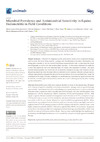Identificador persistente para citar o vincular este elemento:
https://accedacris.ulpgc.es/jspui/handle/10553/107371
| Título: | Microbial prevalence and antimicrobial sensitivity in equine endometritis in field conditions | Autores/as: | Díaz-Bertrana Sánchez, María Luisa Deleuze, Stefan Pitti Rios, Lidia Yeste, Marc Morales Fariña, Inmaculada Rivera del Alamo, Maria Montserrat |
Clasificación UNESCO: | 310907 Patología 310411 Reproducción |
Palabras clave: | Early Estrus Equine Endometritis Microbiologic Study Sensitivity Test |
Fecha de publicación: | 2021 | Publicación seriada: | Animals | Resumen: | Endometritis is one of the main causes of infertility in mares. In the present study, 363 mares with a history of repetitive infertility, and positive endometrial cytology and/or vaginal dis-charge were included. An endometrial swab for microbiological purposes plus sensitivity test was obtained from each mare. A positive culture was obtained in 89% of mares. The main isolated genera were Staphylococcus (25.1%), Streptococcus (18.2%), Escherichia (17.3%) and Pseudomonas (12.1%). With regard to species, the most isolated microorganism was Escherichia coli (17.3%), Staphylococcus spp. (15.6%) and Streptococcus spp. (13.5%9). Sensitivity tests showed that the most efficient antimi-crobial was amikacin (57.3% of cultures), followed by cefoxitin (48.6%) and gentamicin (48.3%). When sensitivity test was analyzed in terms of Gram+ and Gram– bacteria, Gram+ were highly resistant to cephaloridine (77.3% of cultures), apramycin (70.8%) and penicillin (62.3%), whereas Gram– were highly resistant to penicillin (85.8%), followed by cephaloridine (78.9%). In conclusion, the present study shows the most prevalent microorganisms isolated from equine endometritis, which were found to be resistant to β‐lactam antimicrobials. Likewise, these results highlight the significance of performing microbiological analyses as well as sensitivity tests prior to applying an antimicrobial therapy. | URI: | https://accedacris.ulpgc.es/handle/10553/107371 | ISSN: | 2076-2615 | DOI: | 10.3390/ani11051476 | Fuente: | Animals [EISSN 2076-2615], v. 11 (5), 1476, (Mayo 2021) |
| Colección: | Artículos |
Citas SCOPUSTM
23
actualizado el 08-jun-2025
Citas de WEB OF SCIENCETM
Citations
26
actualizado el 22-feb-2026
Visitas
51
actualizado el 11-ene-2026
Descargas
56
actualizado el 11-ene-2026
Google ScholarTM
Verifica
Altmetric
Comparte
Exporta metadatos
Los elementos en ULPGC accedaCRIS están protegidos por derechos de autor con todos los derechos reservados, a menos que se indique lo contrario.
